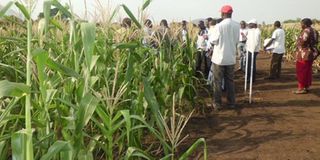Seed companies urged on GM crops

A site in Kasese for field trials of drought resistant maize developed using biotechnology. Various stakeholders including seed companies need to have adequate knowledge on biotechnology. File photo
What you need to know:
As stakeholders, seed companies should have adequate knowledge of varieties developed via biotechnology.
As debate on using biotechnology to develop crop varieties goes on with a lot of controversies over the matter, scientists in the different research institutes under the National Research Organisation are continuing with sensitisation of different stakeholders.
This time, the focus was on seed companies in which they highlighted the importance of the seed companies being armed with knowledge about crops developed using biotechnology especially as regards to hybrids, tissue culture and genetically modified (GM) crops.
The meeting held in Kampala was organised by Uganda Seed Traders Association (Usta) in collaboration with African Seed Traders Association (Asta).
At the event, Komayombi Bulegeya, commissioner crop protection at ministry of agriculture, noted it is as important for seed companies, who are selling different types of seeds to farmers, to have knowledge especially on the yielding capacity.
Enable the farmer
This could be hybrid seeds of cereals such as maize, rice, millet, sorghum, or legumes like groundnuts and beans, or vegetatively propagated ones like banana and cassava.
He added that as the regulatory framework for managing GM crops is being pursued, it is important for seed companies to know facts about these crops so as to be in a position to adequately inform the farmer.
The various stakeholders, including seed companies, need to embrace new technologies because research is being done to enable farmers realise better output.
“Previously, research was done to improve crop varieties and now it is moving genes from one crop to another, which is referred to as modern biotechnology, to address challenges faced by the farmer such as pests and diseases, resistance to salinity and drought,” Bulegeya said.
“There is need for safe management of this technology. At the national level, we have the Cartagena protocol, which outlines issues of safety that scientists have to follow when using modern biotechnology. Uganda lost on the green revolution and we must not lose in the gene revolution,” he said.
The benefits
Dr David Talengera, from National Agricultural Research Laboratories Kawanda, told stakeholders that it is important for people working in seed companies to know factors surrounding farming systems such as pest and disease challenges, soil fertility, weeds, post-harvest practices, cropping system like agronomy practices and strategies for farmers to improve their crop productivity.
He pointed out that while marketing their seeds, they should be in position to tell the farmers and other stakeholders about the benefits of crops developed using modern biotechnology.
“They should be in position to cross-check with scientists if the seed developed does not contain Aflatoxin, is it high yielding, how about the test and so on. They should also be in position to tell the farmers that GM crops are not tissue culture crops and the benefits farmers can achieve from the different varieties developed using tissue culture,” he added.
The Asta communications officer, Daniel Aghan, revealed that in a recent survey carried in Kenya on seed companies, the results indicated that most seed companies were well informed about issues regarding biotech crops including controversies surrounding the technology. He thus urged Usta to conduct a similar survey for the benefit of its members.
Current status of biotech crops in Africa
African countries have increased their land under genetically modified crops.
This was in a report, Global Status of Commercialised Biotech/GM Crops 2013, released by the International Service for the Acquisition of Agri-Biotech Applications (ISAAA).
It also shows that seven countries--Uganda, Kenya, Egypt, Ghana, Cameroon, Malawi, Nigeria --have either carried out or still carrying out confined field trials on various crops including cotton, maize, bananas and sweet potatoes as the penultimate step to approval for commercialisation.
Although the report says biotech crops are contributing to food security and significantly reducing poverty, majority of African countries are yet to embrace growing GM crops due to a combination of factors including strong anti-GM campaigns and the absence of regulatory frameworks.
For instance, the Ugandan Parliament is yet to approve the National Biosafety Bill meant to regulate the general use of the technology.
Kenya is working towards commercialising GM cotton this year after successful field trials showed the crop’s ability to cushion farmers against high production costs.
Further, biotech drought-tolerant maize under the Water Efficient Maize for Africa project is also set for commercialisation in East Africa by 2017 subject to regulatory approvals.
Tanzania has a regulatory framework with the responsibility clause that discourages scientists from even carrying out confined field.
Globally, for the second year in a row, developing countries planted more hectares of biotech crops than industrialised countries.




